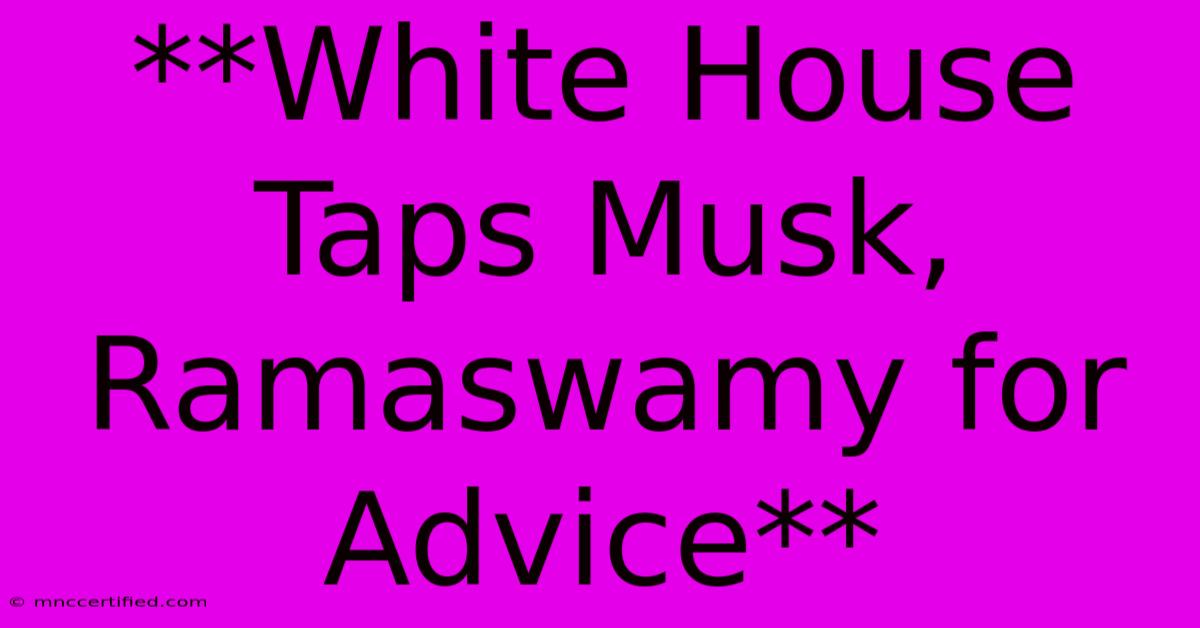**White House Taps Musk, Ramaswamy For Advice**

Table of Contents
White House Seeks Input from Musk and Ramaswamy Amidst Economic Uncertainty
The White House is reportedly seeking advice from two prominent figures in the business and tech world, Elon Musk and Vivek Ramaswamy, as the Biden administration grapples with an uncertain economic landscape. This move, while unusual, suggests a willingness to engage with diverse perspectives, potentially signaling a shift in approach to address pressing economic challenges.
Why Musk and Ramaswamy?
The White House's outreach to these two individuals, known for their bold ideas and disruptive approaches, is likely driven by the need for fresh perspectives on issues like inflation, economic growth, and technological advancement.
- Elon Musk, CEO of Tesla and SpaceX, is a renowned innovator who has revolutionized the electric vehicle and space exploration industries. His expertise in technology, manufacturing, and entrepreneurship could offer valuable insights into the future of the US economy.
- Vivek Ramaswamy, a biotech entrepreneur and author, is known for his libertarian views and focus on innovation as a driver of economic growth. His recent book, "Woke, Inc.", criticizes what he calls the "woke" ideology's impact on business and society.
What Could be Discussed?
While the specific nature of the discussions remains confidential, it's possible that the White House is seeking guidance on:
- Addressing inflation: Musk and Ramaswamy's insights into supply chain disruptions, energy production, and the role of regulation could inform potential policy changes.
- Boosting economic growth: Their experiences in entrepreneurship and innovation could offer valuable perspectives on promoting investment, fostering job creation, and driving technological advancements.
- Navigating the tech landscape: Both individuals have a deep understanding of the tech industry, and their input could help the White House navigate complex issues like artificial intelligence, cybersecurity, and data privacy.
Potential Impact and Criticism
This move could have significant ramifications for the Biden administration. It signals a willingness to engage with non-traditional advisors, potentially leading to innovative policy solutions. However, it also invites criticism from those who disagree with Musk and Ramaswamy's views.
Some argue that their ideological stances may not align with the Biden administration's priorities, and their inclusion could be seen as a capitulation to pressure from the tech industry. Others believe that seeking advice from outside experts is a positive step that could lead to a more effective approach to economic challenges.
What's Next?
The outcome of these discussions remains to be seen. It will be interesting to observe how the White House incorporates the insights of Musk and Ramaswamy, if at all, into its future economic policies. This engagement could potentially lead to a shift in strategy or simply offer valuable insights into the challenges facing the US economy.
Regardless of the outcome, this unexpected outreach highlights the increasing importance of technological expertise and disruptive thinking in shaping economic policy in the 21st century.

Thank you for visiting our website wich cover about **White House Taps Musk, Ramaswamy For Advice**. We hope the information provided has been useful to you. Feel free to contact us if you have any questions or need further assistance. See you next time and dont miss to bookmark.
Featured Posts
-
Lancaster Band On Track For Uk Top 5 Album
Nov 13, 2024
-
Marco Angulo A Tribute To His Life And Impact
Nov 13, 2024
-
Insurance For Pest Control Business
Nov 13, 2024
-
Download Festival 2025 Full Lineup Revealed With Green Day
Nov 13, 2024
-
Warriors Win Curry Shines Thompson Back
Nov 13, 2024